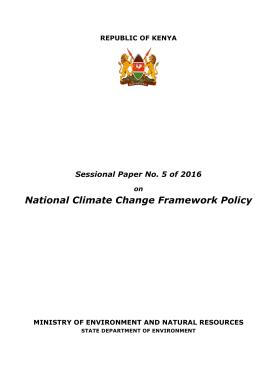Kenya Climate Change Framework Policy 2016
Kenya Climate Change Framework Policy 2016
Kenya is a developing country whose economy is highly dependent on the natural resource base, making it highly vulnerable to climate variability and change.
Realisation of sustainable development in Kenya, despite significant progress to date, is threatened by climate change and its resultant impacts. The country has in the recent past seen increased evidence of climate change such as rising temperatures and changing rainfall patterns, and has experienced extensive climate related impacts through the increased frequency and intensity of extreme weather events such as droughts and flooding. These manifestations of climate change constitute a serious threat to Kenya’s natural, built economic and physical systems, on which the country’s sustainable development and future prosperity depends.
Climate change is defined by the United Nations Framework Convention on Climate Change (UNFCCC) as ‘a change of climate which is attributed directly or indirectly to human activity that alters the composition of the global atmosphere and which is in addition to natural climate variability observed over comparable time periods.’ Current data demonstrates that the climate in Kenya and globally is changing at an unprecedented rate and that unparalleled levels of human induced greenhouse gas (GHG), especially carbon dioxide, emissions are causing an increase in global temperatures that creates changes in the earth’s weather. It is now clear that climate change has become an impediment to the sustainable development of Kenya, and urgent action is required.

